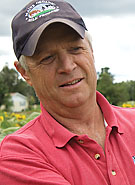
Maine farmers find a friend in Rick Kersbergen ’78
 When a Maine dairy farmer ponders the move to organic production, Rick Kersbergen ’78 is there to ease the transition.
When a Maine dairy farmer ponders the move to organic production, Rick Kersbergen ’78 is there to ease the transition.
A longtime professor in the University of Maine’s Cooperative Extension program, Kersbergen focuses on helping conventional dairy farmers go organic. Twenty percent of Maine’s dairy operations are organic, the highest such rate in the U.S.
For any kind of farmer, the decision to certify organic is often a financial one, Kersbergen says. The higher price commanded for organic milk, for example, can offset the higher cost of production. And Maine, being a tourist destination, sees a high demand for organic produce during the growing season.
But transitioning to organic farming, whether dairy or crops, comes with challenges.
The required record-keeping is extensive. On the dairy side, cows must be managed organically from the last third of gestation onward. A dairy herd transitioning to organic must be organically managed for 12 months to be eligible for certification, which is given by a USDA-approved certifier. A big rule is no antibiotics, which “is a challenge for producers,” says Kersbergen. “Organic farmers have to treat them holistically.”
Indeed, the growing attention to local and organic production often means rediscovering bygone ways of farming.
For example, Kersbergen and his extension team have researched new ways to feed organic herds. By expanding grain production and usage on organic dairies, farmer can reduce their dependence on Midwestern and Canadian grain.
“It used to be cheaper to ship it here, but now that the price of fuel is so high, it’s almost as good to grow grain in the Northeast,” he says. “We’re trying to rebuild some of that knowledge.”


